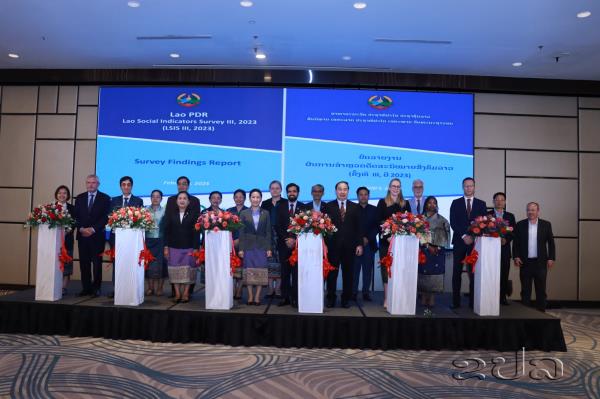KPL
The Lao Statistics Bureau, the Ministry of Planning and Investment, in partnership with the Ministry of Education and Sports and the Ministry of Health, today released the findings of the Lao Social Indicator Survey III (LSIS III).

(KPL) The Lao Statistics Bureau, the Ministry of Planning and Investment, in partnership with the Ministry of Education and Sports and the Ministry of Health, today released the findings of the Lao Social Indicator Survey III (LSIS III).
The crucial survey, supported technically and financially by UNICEF and other development partners—including the EU, Governments of Australia, the United States, Luxembourg, and UNFPA—the survey provides a data-driven snapshot of progress and challenges in the lives of children, women, and families.
LSIS III confirms significant gains in child survival, reproductive and maternal health, and access to clean drinking water. “This survey reinforces our commitment to investing in robust data,” said Ms. Phonesaly Souksavath, Head of the Lao Statistics Bureau, “which will guide our efforts to accelerate progress, especially for the most vulnerable families and children.”
However, rising stunting and wasting rates among children, disparities in education outcomes, and high child marriage rates remain major obstacles. UNICEF Country Representative to the Lao PDR, Mr. Bilal Aurang Zeb Durrani, stressed these results remind us that every child—regardless of where they live—deserves quality health care, adequate nutrition, protection, and the opportunity to learn and thrive. The LSIS III will guide our joint efforts with the government and partners to ensure no child is left behind.
As the Lao PDR prepares to finalize its 10th Five-Year National Socio-Economic Development Plan (NSEDP) in 2025, evidence from LSIS III will be vital for shaping policies that uphold children’s rights. From expanding access to quality education and health care, to reducing inequalities across regions, ethno-linguistic groups, and income levels, the data offers a blueprint for action that puts children at the center of the nation’s development.
“Accurate and timely data is critical for tailoring solutions that meet the needs of children and families. LSIS III enables us all to better understand the gaps and work hand-in-hand with Lao PDR to address them, in line with both national priorities and global child rights frameworks,” said Ms Kate Goodfruit, Second Secretary, Embassy of Australia to Laos.
EU Ambassador to Laos, Mr. Mark Gallagher mentioned the European Union stands firmly with the Lao PDR in its efforts to ensure every child can grow, learn, and thrive. We believe that robust, reliable data are the foundation of effective policymaking.
UNFPA Representative to Laos, Mr. Bakhtiyor Kadyrov said that investing in maternal health and adolescent well-being is a cornerstone of sustainable development. LSIS III helps us track progress and pinpoint areas needing urgent attention.
“Luxembourg is proud to support the Lao PDR in its pursuit of equitable social development. These findings will guide future collaborative efforts to reach the most vulnerable,” said Charge d’Affaires of Luxembourg to Laos, Mr. Thomas Lammar.
KPL